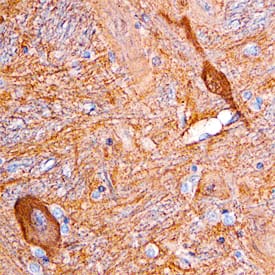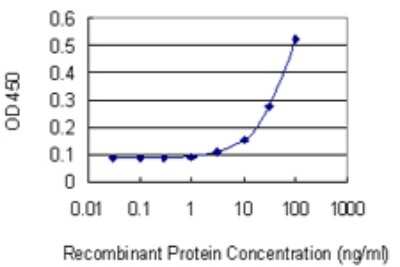Dimethylarginine Dimethylaminohydrolase 1/DDAH1 Products
Dimethylarginine Dimethylaminohydrolase (DDAH) metabolizes asymmetric dimethyl arginine (ADMA) to L-citrulline and dimethylamine, and NG-monomethyl arginine (MMA) to L-citrulline and monomethylamine. Two members of the DDAH family have been identified in humans. DDAH1 is widely expressed, especially in liver and kidney. DDAH2 predominates in vascular endothelium and expressed selectively in kidney. It is also expressed in immune tissues including spleen, thymus, peripheral leukocytes, lymph nodes, and bone marrow. Over 90% of endogenous ADMA is metabolized by DDAH with the remainder excreted. ADMA and MMA are endogenous inhibitors of nitric oxide synthase (NOS). Thus, enzymes of the DDAH family play a key role in vascular function through the turnover of methylated arginine. It has been observed that genetic variation in the DDAH1 and DDAH2 genes is significantly associated with serum ADMA levels.
43 results for "Dimethylarginine Dimethylaminohydrolase 1/DDAH1" in Products
43 results for "Dimethylarginine Dimethylaminohydrolase 1/DDAH1" in Products
Dimethylarginine Dimethylaminohydrolase 1/DDAH1 Products
Dimethylarginine Dimethylaminohydrolase (DDAH) metabolizes asymmetric dimethyl arginine (ADMA) to L-citrulline and dimethylamine, and NG-monomethyl arginine (MMA) to L-citrulline and monomethylamine. Two members of the DDAH family have been identified in humans. DDAH1 is widely expressed, especially in liver and kidney. DDAH2 predominates in vascular endothelium and expressed selectively in kidney. It is also expressed in immune tissues including spleen, thymus, peripheral leukocytes, lymph nodes, and bone marrow. Over 90% of endogenous ADMA is metabolized by DDAH with the remainder excreted. ADMA and MMA are endogenous inhibitors of nitric oxide synthase (NOS). Thus, enzymes of the DDAH family play a key role in vascular function through the turnover of methylated arginine. It has been observed that genetic variation in the DDAH1 and DDAH2 genes is significantly associated with serum ADMA levels.
| Reactivity: | Human |
| Details: | Rabbit IgG Polyclonal |
| Applications: | IHC |
| Reactivity: | Human |
| Details: | Sheep IgG Polyclonal |
| Applications: | IHC |
| Reactivity: | Human, Mouse, Rat |
| Details: | Rabbit IgG Polyclonal |
| Applications: | IHC, WB, ICC/IF |
| Reactivity: | Human |
| Details: | Goat IgG Polyclonal |
| Applications: | WB, ELISA, ICC/IF, Flow |
Recombinant Monoclonal Antibody
| Reactivity: | Human, Rat |
| Details: | Rabbit IgG Monoclonal Clone #1Q5F6 |
| Applications: | WB |
| Reactivity: | Human, Mouse |
| Details: | Rabbit IgG Polyclonal |
| Applications: | WB, ICC/IF |
| Applications: | ELISA |
| Reactivity: | Human |
| Details: | Rabbit IgG Polyclonal |
| Applications: | IHC |
| Reactivity: | Human |
| Details: | Mouse IgG2a Kappa Monoclonal Clone #3F7 |
| Applications: | WB, ELISA |
| Reactivity: | Human |
| Details: | Rabbit IgG Polyclonal |
| Applications: | WB |
| Reactivity: | Human |
| Details: | Rabbit IgG Polyclonal |
| Applications: | IP |
| Reactivity: | Human |
| Details: | Rabbit IgG Polyclonal |
| Applications: | IHC |
| Reactivity: | Human |
| Details: | Rabbit IgG Polyclonal |
| Applications: | IHC, ICC/IF |
| Reactivity: | Human |
| Details: | Rabbit IgG Polyclonal |
| Applications: | IHC, ICC/IF |
| Reactivity: | Human |
| Details: | Rabbit IgG Polyclonal |
| Applications: | IHC |
| Source: | E. coli |
| Accession #: | O94760 |
| Applications: | EnzAct |
| Reactivity: | Human |
| Details: | Rabbit IgG Polyclonal |
| Applications: | IHC |
| Reactivity: | Human |
| Details: | Rabbit IgG Polyclonal |
| Applications: | IHC |
| Reactivity: | Human |
| Details: | Rabbit IgG Polyclonal |
| Applications: | IHC |
| Reactivity: | Human |
| Details: | Rabbit IgG Polyclonal |
| Applications: | IHC |
| Reactivity: | Human |
| Details: | Rabbit IgG Polyclonal |
| Applications: | IHC |
| Reactivity: | Human |
| Details: | Rabbit IgG Polyclonal |
| Applications: | IHC |
| Reactivity: | Human |
| Details: | Rabbit IgG Polyclonal |
| Applications: | IHC |
| Reactivity: | Human |
| Details: | Rabbit IgG Polyclonal |
| Applications: | IHC |
| Reactivity: | Human |
| Details: | Rabbit IgG Polyclonal |
| Applications: | IHC |




![Immunohistochemistry-Paraffin: Dimethylarginine Dimethylaminohydrolase 1/DDAH1 Antibody [NBP1-85273] Immunohistochemistry-Paraffin: Dimethylarginine Dimethylaminohydrolase 1/DDAH1 Antibody [NBP1-85273]](https://resources.bio-techne.com/images/products/Dimethylarginine-Dimethylaminohydrolase-1-DDAH1-Antibody-Immunohistochemistry-Paraffin-NBP1-85273-img0017.jpg)
![Flow Cytometry: Dimethylarginine Dimethylaminohydrolase 1/DDAH1 Antibody [NB300-916] Flow Cytometry: Dimethylarginine Dimethylaminohydrolase 1/DDAH1 Antibody [NB300-916]](https://resources.bio-techne.com/images/products/Dimethylarginine-Dimethylaminohydrolase-1-DDAH1-Antibody-Flow-Cytometry-NB300-916-img0005.jpg)
![Western Blot: Dimethylarginine Dimethylaminohydrolase 1/DDAH1 Antibody (1Q5F6) [NBP3-16444] Western Blot: Dimethylarginine Dimethylaminohydrolase 1/DDAH1 Antibody (1Q5F6) [NBP3-16444]](https://resources.bio-techne.com/images/products/Dimethylarginine-Dimethylaminohydrolase-1-DDAH1-Antibody-1Q5F6-Western-Blot-NBP3-16444-img0001.jpg)
![Western Blot: Dimethylarginine Dimethylaminohydrolase 1/DDAH1 Antibody [NBP1-31012] Western Blot: Dimethylarginine Dimethylaminohydrolase 1/DDAH1 Antibody [NBP1-31012]](https://resources.bio-techne.com/images/products/Dimethylarginine-Dimethylaminohydrolase-1-DDAH1-Antibody-Western-Blot-NBP1-31012-img0006.jpg)
![ELISA: Human Dimethylarginine Dimethylaminohydrolase 1/DDAH1 - Ready-To-Use ELISA Kit (Colorimetric) [NBP3-31419] - Human Dimethylarginine Dimethylaminohydrolase 1/DDAH1 - Ready-To-Use ELISA Kit (Colorimetric)](https://resources.bio-techne.com/images/products/nbp3-31419_dimethylarginine-dimethylaminohydrolase1-ddah1-rtu-elisakit-20620241532270.png)
![Immunohistochemistry-Paraffin: Dimethylarginine Dimethylaminohydrolase 1/DDAH1 Antibody [NBP3-17013] Immunohistochemistry-Paraffin: Dimethylarginine Dimethylaminohydrolase 1/DDAH1 Antibody [NBP3-17013]](https://resources.bio-techne.com/images/products/Dimethylarginine-Dimethylaminohydrolase-1-DDAH1-Antibody-Immunohistochemistry-Paraffin-NBP3-17013-img0002.jpg)

![Western Blot:[NBP3-29991]- Dimethylarginine Dimethylaminohydrolase 1/DDAH1 Antibody](https://resources.bio-techne.com/images/products/nbp3-29991_rabbit-dimethylarginine-dimethylaminohydrolase-1-ddah1-pab-2312025128851.jpg)
![Immunoprecipitation:Dimethylarginine Dimethylaminohydrolase 1/DDAH1 AntibodyNBP3-30296] - Dimethylarginine Dimethylaminohydrolase 1/DDAH1 Antibody](https://resources.bio-techne.com/images/products/nbp3-30296_rabbit-dimethylarginine-dimethylaminohydrolase-1-ddah1-pab-3012202420415713.jpg)
